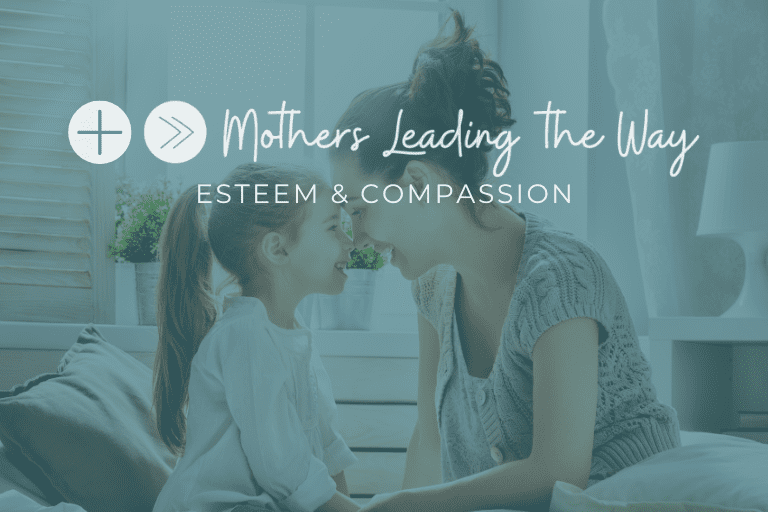Unfortunately, parenthood doesn’t come with a handbook or a set of accessible guidelines on how to be a mother. As parents, we make decisions for our children that we think are in their best interest, with no clear idea of what the outcome will be. Parent decision-making is influenced by so many factors, and the reactions – from your child, yourself, and your peers – are sometimes negative. Parenthood is never-ending; therefore, it can be difficult to feel a sense of satisfaction or completion. Thus, we turn to the fifth installment of our VALUES CAN INSPIRE series, looking at self-esteem and self-compassion and how cultivating both can help improve the way you parent, make decisions, and feel about yourself after experiencing different outcomes.
Self-compassion is the idea of having compassion toward oneself during times of failure or difficulty (Neff, 2003). Self-compassion says that we should show ourselves grace and kindness during the moments when we feel that we have failed or are really struggling. Instead of talking negatively towards ourselves and beating ourselves up for not being perfect, we should show ourselves the same compassion we would show a loved one.
Self-compassion involves the interaction of three main components: self-kindness versus self-judgment, feelings of common humanity versus isolation, and mindfulness versus over-identification. As a mother, we might find it easier to isolate and feel self-judgment towards ourselves when life becomes difficult or when the outcome of a decision is not what we had hoped for. Self-kindness allows us to remain supportive of ourselves and approach our flaws gently. A self-compassionate individual accepts their flaws and imperfections. As a mother, it is important to recognize that everyone fails, makes mistakes, and feels inadequate at times (remember our post on universal humanity?). The idea of common humanity is being aware that failure is part of human nature and not allowing ourselves to isolate ourselves when feeling this way. Mindfulness, the ability to recognize and face the suffering we feel while judging ourselves, is also an important aspect of self-compassion (Neff, 2011). As a mother, it is okay to stop and acknowledge the feelings of failure and judgment towards oneself and the pain that accompanies it. Being mindful of our feelings prevents us from the overwhelming feeling of self-pity and stops us from wallowing.
At some point during motherhood, we might feel like we are being judged by other people or other mothers. Mothers tend to feel so much pressure to be perfect and raise perfect children when that is not realistic. There are going to be times when we feel incompetent because someone is always telling us how to raise our children. Balter (1995) talks about the importance of trusting yourself as you are the expert when it comes to your child. Nobody knows your child like you do, and there is no such thing as a perfect parent. Every mother makes mistakes, and that’s okay! Moms, strive to be good in your role; this is much more realistic than attaining perfection.
Children are going to experience unpleasant emotions such as anger, boredom, sadness, and anxiety. It is human instinct to want to protect them and prevent them from these feelings. While we may think we are helping our kids by removing strains to create a sense of perfection, we may be doing more harm than good. What does this mean? The pressure is off! We do not even have to attempt to remove all types of frustration from our children’s lives. In fact, we do more harm than good when we try. Children need to experience some unpleasant emotions to give them the chance to conquer their life struggles further down the line. This is how children learn to be resourceful so that they can feel more confident.
There is some value in imperfection, and we must lean into those moments with self-compassion. For example, you just went to the grocery store, and your kid cried the entire time because you forgot to bring along their favorite emotional support blanket. No matter what you did, they just would not let up crying, but you didn’t have the time to go back home and grab the item, so you stuck it through and shopped with your kid screaming at the top of their lungs for 45 minutes. You got home and felt awful that you didn’t handle the situation differently and felt like a bad mom because of the looks you got from other customers at the store. Your self-talk is at an all-time low, and you are now near tears. Now, if you met yourself with kindness and grace, you would tell yourself that you are just a human who sometimes makes mistakes. You might also see that your kid has moved on from the situation and is already happy and playing with his other toys at home. What you might not see right away is that your kid also may have learned that even though they were uncomfortable without their blanket at the store, they were able to make it through safely! Who knows – maybe next time you forget the blanket, they won’t even flinch because they have already gained some confidence knowing they have what it takes to ride through the grocery store without it.
Self-esteem – the way you view yourself – can greatly influence how quickly you reach the stage of self-compassion. In the example above, it can mean the difference between taking several days and just several hours to reach the point of “Well, it happened, and it’s over, and my kid is okay, and I’m not a lesser mom because of it.” Think about it this way: if you already view yourself in a negative light (not worthy enough, not good enough, etc.), it’s going to be so much harder to jump over that barrier to show yourself compassion. If you have a positive self-image, the barrier of negativity isn’t there, and the journey to self-compassion is much quicker.
References and Further Reading
Neff, K. (2003). Self-compassion: An alternative conceptualization of a healthy attitude toward oneself. Self and identity, 2(2), 85-101. https://doi.org/10.1080/15298860390129863
Blyth, D. A., & Traeger, C. (1988). Adolescent self-esteem and perceived relationships with parents and peers. In S. Salzinger, J. S. Antrobus, & M. Hammer (Eds.), Social networks of children, adolescents, and college students (pp. 171–194). Lawrence Erlbaum Associates, Inc.
Neff, K. D. (2011). Self-compassion, self-esteem, and wellbeing. Social and Personality Psychology Compass, 5(1), 1-12. https://doi.org/10.1111/j.1751-9004.2010.00330.x
Wells, A. J. (1988). Variations in mothers’ self-esteem in daily life. Journal of Personality and Social Psychology, 55(4), 661-668.

